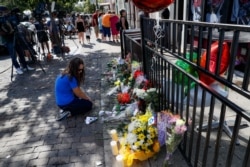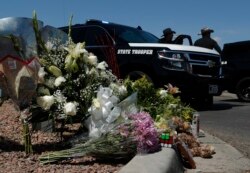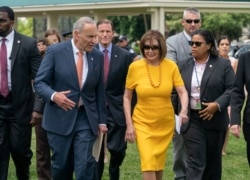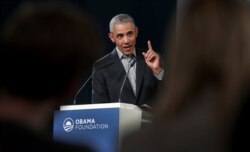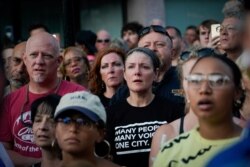Updated Aug. 5, 7:03 p.m.
Kenneth Schwartz contributed to this report.
WHITE HOUSE — Responding to mass shootings in the United States, President Donald Trump is vowing "to act with urgent resolve," explicitly condemning white supremacy and calling for strong background checks for gun purchases.
But Trump is not advocating major gun control legislation, disappointing advocates who favor such measures. Nor did he respond to his critics, who say his own heated anti-immigrant rhetoric, especially about Mexicans, contributed to a toxic atmosphere.
Trump made remarks Monday at the White House after a pair of mass shootings 13 hours apart in El Paso, Texas, and Dayton, Ohio. Lone gunmen in both cities killed a total of at least 31 people and wounded dozens.
"In one voice, our nation must condemn racism, bigotry and white supremacy," Trump said, noting hatred expressed in a "manifesto" attributed to the young white man being held as the suspect for Saturday's shooting at a Walmart store in El Paso, a city on the Mexican border. "These sinister ideologies must be defeated. Hate has no place in America."
Trump also said, "Hatred warps the mind, ravages the heart and devours the soul."
Visits to El Paso, Dayton
Plans are being made for Trump to visit both El Paso and Dayton this week. He has already postponed a trip he planned to take Tuesday to Florida.
In his White House remarks Monday, Trump also focused on mental illness, and violence in the media and in video games, warning of "the perils of the internet and social media."
The president advocated red flag laws to try to identify those who could potentially commit such mass violence and stop them from getting their hands on such weapons.
Trump termed the mass shootings "barbaric slaughter ... an assault upon our communities, an attack upon our nation and a crime against all of humanity."
Trump spoke for a little less than 10 minutes and did not respond to questions from reporters.
Congress has only sporadically enacted gun policy changes over the past few decades, in part because of opposition from gun advocates who insist the U.S. Constitution guarantees Americans the right to own a weapon.
"It took less than three hours for the president to back off his call for stronger background check legislation. When he can't mention guns while talking about gun violence, it shows the president remains prisoner to the gun lobby and the NRA (National Rifle Association)," said the two top Democratic Party lawmakers in Congress, House Speaker Nancy Pelosi and Senate Minority Leader Chuck Schumer, in a joint statement.
Trump's Democratic opponents, including several hoping to run against him in next year's election, have blamed his oft-repeated anti-immigration rhetoric as fostering the hate that contributed to the El Paso mass killing.
'Mouths of our leaders'
Trump's predecessor, Barack Obama, who also had to confront the scourge of mass shootings, issued a statement saying: "We should soundly reject language coming out of the mouths of our leaders that feeds a climate of fear and hatred or normalizes racist sentiments ... or suggest that other people, including immigrants, threaten our way of life."
Former President Obama did not mention any of those leaders by name. Trump has frequently called Mexicans and migrants trying to cross into the United States criminals, rapists, and drug dealers.
Trump, however, blamed a favorite target — the mainstream news media — in an early Monday tweet, prior to his White House speech.
The country's biggest pro-gun rights lobbying group, the National Rifle Association, appeared to agree with Trump that mass gun violence is also a mental health issue, saying, "Those who have been adjudicated as a danger to themselves or others should not have access to firearms and should be admitted for treatment."
At least 22 people were killed and more than two dozen wounded in the El Paso Walmart attack. Police are investigating it as a possible hate crime. The suspected gunman, 21-year-old Patrick Crusius, allegedly wrote a manifesto condemning race mixing. Some reports say he told police he went to Walmart to kill as many Mexicans as possible.
Officials say they will seek the death penalty for the Texas attack, which they are treating as an act of domestic terrorism.
Eight Mexican citizens were among those killed in El Paso. Mexicans frequently cross into the city to shop at Walmart and Mexican President Andrés Manuel Lopez Obrador called on the U.S. Congress to enact stronger gun laws.
"We're very respectful of what other governments decide ... if we look at things objectively, we have to say that the two main U.S. parties have given little attention to gun control," he said Monday.
Motive sought
Authorities in Dayton are also searching for a motive behind the rampage in the Ohio city's popular nightlife district early Sunday. The gunman, identified as 24-year-old student Connor Betts, killed nine people, including his sister, and wounded 14 others.
Police shot and killed Betts within 30 seconds, perhaps saving hundreds of lives. They say he was wearing body armor and carrying extra magazines containing up to 250 rounds of ammunition.
Former classmates say he had expressed hostility during his high school years. He allegedly put together a "hit list" of those he wanted to kill and a "rape list" of girls he wanted to attack. He was legally able to buy the weapons and ammunition he used.
The U.S. once banned the sale of assault-type weapons like those employed by the gunmen in El Paso and Dayton, but Congress allowed the law to expire in 2004.
The Texas and Ohio shootings occurred a week after a gunman killed three people at a food festival in California.
According to monitoring groups, there have been more than 250 mass shootings in the United States this year.





